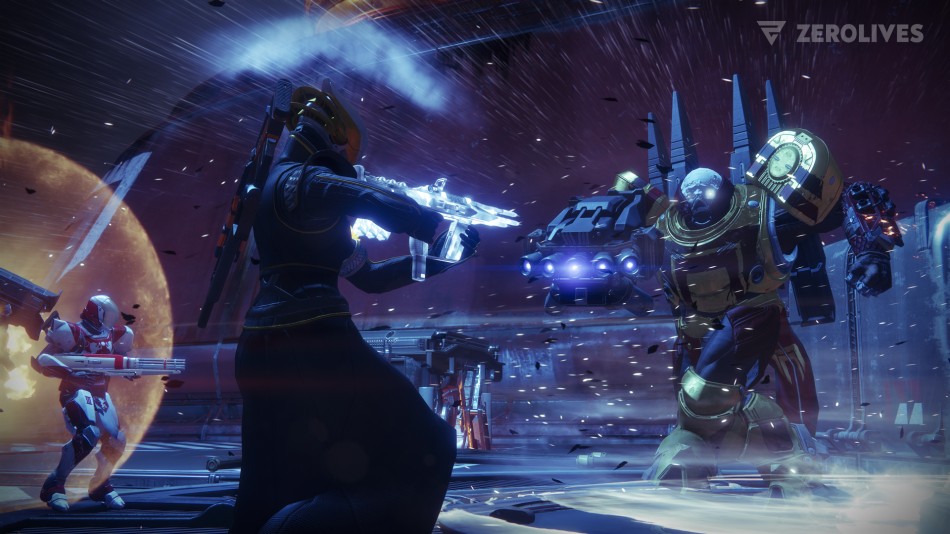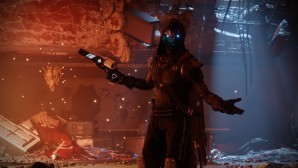Destiny 2 is the latest installment in Bungie's "shared world" science fiction adventure shooter franchise and is the direct sequel to the first game that was released in 2014.
In Destiny 2 players assume the role of a Guardian, protectors of Earth's last safe city as they wield a power called Light to protect the Last City from different alien races.
One of these races, the Cabal, lead by their emperor, Dominus Ghaul, infiltrate the Last City and strips all Guardians of their Light. Players set out on a journey to regain their Light and find a way to defeat Ghaul and his Red Legion army and take back the Last City.
Story
The Cabal have taken Earth, the Guardian stronghold of the Last City and, most importantly, the Traveler. Your job as a Guardian is to find a way to fight back after losing everything.
The story features the typical twists and turns you would expect. The "big bad villain" seeks power and finds it and only you can stop his onslaught, but first you must find the resources to do so.
The only thing that really stood out to me was Nathan Fillion's portrayal of Cade who is the most charismatic character by far.
Generally speaking, Destiny 2 is not for gamers who seek a decent story-driven game. Just like the original, Destiny 2 is primarily a lootfest "shared-world" shooter game.
If a fantastic story is what you're looking for, you're going to be disappointed. It works for what it is, but it doesn't move beyond the most basic role-playing tropes.
Gameplay
As always, Bungie knows exactly what they are doing with the shooting mechanics. These are very similar to the original Destiny but also feature various improvements.
Weapons handle in a satisfying manner and your powers are based on class and item choices to perfectly suit your playstyle. DPS, Healer and Tank are the gist of the roles on offer as Titan, Warlock and Hunter fulfill these roles perfectly.
The game features the same three playable character races as the original: Human, Awoken and Exo, and these can be selected after picking a main class.
The game offers one new subclass per main class and two subclasses that return from the original game. The two returning subclasses have been changed significantly, especially in regards to the skill tree system. In general no particular class has an unfair advantage.
Each of them are suited to a particular playstyle and franchise veterans, like myself, will know what to expect.
Warlocks get a Healing Rift for more defensive gameplay based on perks. Hunters get a Dodge Roll and Throwing Knives for more versatile gameplay. Titans are the high-risk tanks of the bunch as they come in with more damage resistance but also more tame class abilities.
All the supers have strengths and weaknesses and Warlocks have lost the revive that was available in the original game to balance things out.
Activities consist of story missions, side-missions, Public Events, Lost Sectors, Strikes, PvP and the new Leviathan raid that launched last week.
Public Events spawn in the overworld areas of Earth, Titan, Nessus and Io. Any player nearby can join the event. Once players complete certain objectives it will become a Heroic Public Event. These type of events are generally harder to complete but also reward better loot: higher level and higher damage weapons and better armor.
Lost Sectors are repeatable hidden dungeons or side areas that contain large numbers of enemies. As players work their way through they will encounter a final boss and an unlockable treasure chest after defeating it. The chests often contain at least one piece of equipment and a planet Token.
Strikes are high-level story missions that typically last twenty to thirty minutes on average. These missions can only be played in a Fireteam, a squad of three players. If you don't have friends to play with the game's matchmaking system will allow you to join a Fireteam. There are currently six Strikes available, of which one is a PlayStation 4 exclusive.
All these activities give loot as a reward and rewards are linked to RNG just like the original. The rewards are better than the original, but the soft level cap of 270 on gear hurts the game and only serves to artificially extend the time played.
Doing weekly activities like Nightfall Strikes and side-quests that both reward gear lighten the grind significantly. I didn't spend as much time grinding once I figured out which activities reward the player most, but the initial grindfest was an issue for me due to the slow progression.
The game falters is in the same areas as the original: repetitive side-missions, unbalanced multiplayer weaponry and a loot system that seems to want to keep you where you are in terms of combat strength.
Soundtrack
The music fits the game extremely well. There is never a dull moment just because of how good it is. None of the tracks annoyed me during my time with the game, which is pretty rare.
The studio even uploaded the entire soundtrack on YouTube presumably because they realized it would get ripped and uploaded by fans anyway.Graphics
The sequel is the first game in the franchise to support the PC. The advanced graphics options, especially particle effects, are very pleasing to the eye and are definitely a step up from the console versions.
Combat effects have never looked better, especially when running the game at a solid 60 frames per second. It improves the experience immensely.
The game runs smoothly with the Draw Distance option turned down to medium. On higher settings the game tries to load high-quality assets that are visible in the distance which will bring most PC rigs down to 45 frames per second on average in a firefight. The console version is limited to 30 frames per second.
Besides that, the game is arguably one of Activision's best PC ports and runs like butter in nearly every area of the game. Integrated graphics cards can even run the game at the lowest settings. Overall it is a surprisingly well done and good looking port.
Conclusion
Destiny 2 had quite the hurdle to overcome with the lukewarm reception of the first title, which needed several expansion packs to really address its issues. Some of these issues still exist in the sequel, such as repetitive weekly activities and the typical grindfest that many will find less than rewarding as they start out.
However, gunplay is tighter and veteran players will be right at home with the new mechanics in place that ensure a lasting appeal. Destiny 2 is the hypothetical Destiny if Bungie had learned their lessons from Destiny: The Taken King before its initial release.
Activities, while grindy at first, feel less like a chore this time around and are more geared towards delivering a fun experience. That is not to say the game doesn't have it's lingering issues, but, at the very least, the benefits of the reworked gameplay mechanics have done wonders for this sequel.
Overall Destiny 2 is a worthy sequel to a shooter that never really sat well with gamers who are primarily interested in story-driven content. Those who enjoyed Destiny's loot system and the accompanying grind will find more of the same.
Destiny 2 stands head and shoulders above the half-baked first title and is worth your time if loot strikes your fancy. I look forward to seeing how expansion content will improve the game even more. Those who are searching for a decent story-driven game should steer clear and those primarily looking for a multiplayer experience will find an advancement of the first game's approach.

















Comments